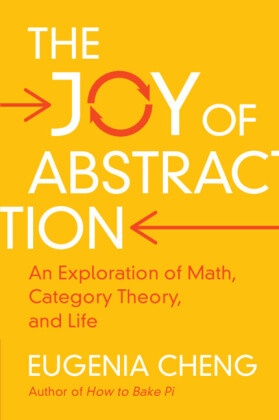The Joy of Abstraction - An Exploration of Math, Category Theory, and Life
| Verlag | Cambridge University Press |
| Auflage | 2024 |
| Format | 15,5 x 3,5 x 23,0 cm |
| Gewicht | 748 g |
| Artikeltyp | Englisches Buch |
| EAN | 9781108708449 |
| Bestell-Nr | 10870844UA |
A uniquely accessible introduction to abstract mathematics and category theory written by popular science author of How to Bake Pi.
Mathematician and popular science author Eugenia Cheng is on a mission to show you that mathematics can be flexible, creative, and visual. This joyful journey through the world of abstract mathematics into category theory will demystify mathematical thought processes and help you develop your own thinking, with no formal mathematical background needed. The book brings abstract mathematical ideas down to earth using examples of social justice, current events, and everyday life - from privilege to COVID-19 to driving routes. The journey begins with the ideas and workings of abstract mathematics, after which you will gently climb toward more technical material, learning everything needed to understand category theory, and then key concepts in category theory like natural transformations, duality, and even a glimpse of ongoing research in higher-dimensional category theory. For fans of How to Bake Pi, this will help you dig deeper into mathematical concepts and build your mathematical background.
Inhaltsverzeichnis:
Prologue; Part I. Building Up to Categories: 1. Categories: the idea; 2. Abstraction; 3. Patterns; 4. Context; 5. Relationships; 6. Formalism; 7. Equivalence relations; 8. Categories: the definition; Interlude: A Tour of Math: 9. Examples we've already seen, secretly; 10. Ordered sets; 11. Small mathematical structures; 12. Sets and functions; 13. Large worlds of mathematical structures; Part II. Doing Category Theory: 14. Isomorphisms; 15. Monics and epics; 16. Universal properties; 17. Duality; 18. Products and coproducts; 19. Pullbacks and pushouts; 20. Functors; 21. Categories of categories; 22. Natural transformations; 23. Yoneda; 24. Higher dimensions; 25. Epilogue: thinking categorically; Appendices: A. Background on alphabets; B. Background on basic logic; C. Background on set theory; D. Background on topological spaces; Glossary; Further reading; Acknowledgements; Index.
Rezension:
'This book is an educational tour de force that presents mathematical thinking as a right-brained activity. Most 'left brain/right brain' education-talk is at best a crude metaphor; but by putting the main focus on the process of (mathematical) abstraction, Eugenia Cheng supplies the reader (whatever their 'brain-type') with the mental tools to make that distinction precise and potentially useful. The book takes the reader along in small steps; but make no mistake, this is a major intellectual journey. Starting not with numbers, but everyday experiences, it develops what is regarded as a very advanced branch of abstract mathematics (category theory, though Cheng really uses this as a proxy for mathematical thinking generally). This is not watered-down math; it's the real thing. And it challenges the reader to think-deeply at times. We 'left-brainers' can learn plenty from it too.' Keith Devlin, Stanford University (Emeritus), author of The Joy of Sets

